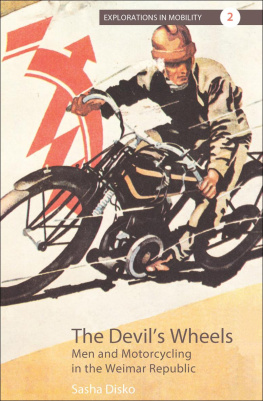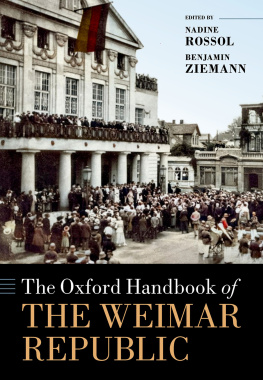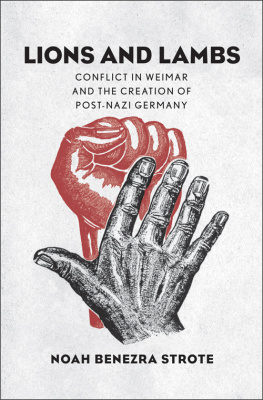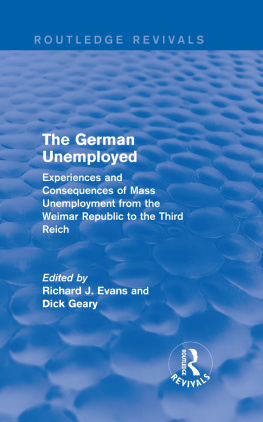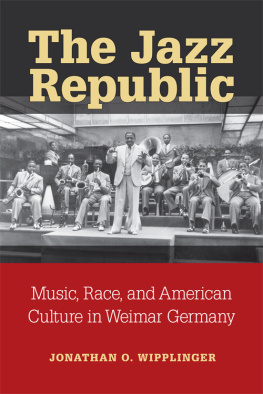The Devils Wheels
Explorations in Mobility
Series Editors:
Gijs Mom, Eindhoven University of Technology
Mimi Sheller, Drexel University
Georgine Clarsen, University of Wollongong
The study of mobility opens up new transnational and interdisciplinary approaches to fields including transport, tourism, migration, communication, media, technology, and environmental studies. The works in this series rethink our common assumptions and ideas about the mobility of people, things, ideas, and cultures from a broadly understood humanities perspective. The series welcomes projects of a historical or contemporary nature, and encourages postcolonial, non-Western, and critical perspectives.
Volume 1
Atlantic Automobilism
The Emergence and Persistence of the Car, 18951940
Gijs Mom
Volume 2
The Devils Wheels
Men and Motorcycling in the Weimar Republic
Sasha Disko
Volume in Preparation
Driving Modernity
Technology, Experts, Politics, and Fascist Motorways, 19221943
Massimo Moraglio
The Devils Wheels
Men and Motorcycling in the Weimar Republic
Sasha Disko
First published in 2016 by
Berghahn Books
www.berghahnbooks.com
2016, 2019 Sasha Disko
First paperback edition published in 2019
All rights reserved. Except for the quotation of short passages for the purposes of criticism and review, no part of this book may be reproduced in any form or by any means, electronic or mechanical, including photocopying, recording, or any information storage and retrieval system now known or to be invented, without written permission of the publisher.
Library of Congress Cataloging-in-Publication Data
A C.I.P. cataloging record is available from the Library of Congress
British Library Cataloguing in Publication Data
A catalogue record for this book is available from the British Library
ISBN 978-1-78533-169-5 hardback
ISBN 978-1-78920-523-7 paperback
ISBN 978-1-78533-170-1 ebook
For C.S.
List of Illustrations
Images
Tables
Preface

M any years ago now, first seized by a drive to explore the relationship between consumption practices and the construction of modern German masculinities, I went about outlining a study centered on the automobile. After all, at least to a significant degree, the automobiles pedigree is German. A principal realm for male consumption, researching the automobile promised to provide insights into the manifold social conflicts and contradictions of classical modernity and, particularly in relation to the construction of gender in Weimar Germany, it appeared understudied. After initial visits to the archives, however, I discovered the numerical dominance of motorized two-wheelers and was moved to take the project in a different direction. My focus on motorcycling thus stems not from a personal connection to or fetish for these undeniably aesthetically powerful objects. Indeed, I am the only sister of three never to have possessed a motorcycle license. Instead, my motivation has been intellectual, arising from a desire to capture the specificity of motorization in Germany and thus to be better able to analyze its impacts on the broadest range of users, including working-class motorists. Motorcycles offered a cipher to decode modern mobility.
Visitors to Berlins German Historical Museum may have come across Lotte Lasersteins 1929 oil portrait of a motorcyclist that hangs prominently in the gallery devoted to everyday life in the Weimar Republic. Painted in a New Objectivity style, Lasersteins motorcyclist, who stands solidly in front of a motorcycle and assorted tools, is leather clad and resolute, yet his class status is unclear. With this image, Laserstein rendered an iconic figure of the erathe motorcyclistin its striking ambivalence. Like her painting, this book represents my attempt at reading these motorcyclists stories to portray everyday life in uncertain times.
Acknowledgments

T he pursuit of this endeavor was generously enabled by a number of institutions. A fifteen-month research fellowship at the Berlin Program at the Freie Universitt Berlin as well as a short-term follow-up visit, funded by the German Academic Exchange Service, DAAD, allowed me to gather a great deal of the material that forms the basis for this study. Two years at the Center for Metropolitan Studies at the Technischen Universitt Berlin, and a ten-month Angsar-Rummler fellowship at the Wissenschaftskolleg zu Berlin helped me build on and retool my initial findings, and, importantly, gave me time to craft a polished product. New York University, Berlin allowed me space and time to conclude this project. I would also like to thank those people, institutions, and corporations that agreed to reproductions of the illustrations in this book. While institutional assistance was essential, intellectual support was equally, if not more important. Gijs Mom challenged me to engage more deeply with mobility studies, and convinced me that it provides a useful framework for my study. The TELEUNIT group, a virtual community, kept me on track during the long haul of rewrites and edits. The editors at Berghahn Books, especially Caroline Kuhtz in Production, have been supportive in helping me get to the finish line.
For engaging with this project during various stages along the meandering journey, I thank in particular Hillary Angelo, Elisabetta Bini, Dorothee Brantz, Maggie Clinton, Ray Daniels, Sarah Ehlers, Atina Grossmann, Samara Heifetz, Stefan Hhne, Sabine Horlitz, The Hysterical Materialists, Bruce Kogut, Nathan Marcus, Shane Minkin, Khary Polk, Sherene Seikaly, Quinn Slobodian, Frank Steinbeck, and Anne Vogelpohl. I was blessed by the guidance of Mary Nolan and Manu Goswami, who stand out both as mentors and as friends. Manu Goswami continually spurred me to question deeply the connections between shifts in social and spatial relations, the process of motorization, and the contours and contradictions of modernity. More than anyone else, Mary Nolan committed her acute attention to helping me shape this project over the many years between its incipience and its completion.
From the San Francisco Bay area to New York City, Munich, Bremen, Hannover, Hamburg, Berlin, and places between, family and friends, far too many to mention by name, gave me encouragement. My sisters, Monika Bhushan and Gitanjali Denley, my brother-in-law, Orion, the Teutsch and Schmidt families, and my parents, Cybele Lo Vuolo Bhushan and Abhay Bhushan, cheered me on, even though my interests rarely seemed to overlap with their own. To my wonderful friend Andy Pollack, who has been here when I needed him most. I dedicate this book to my truly beloved husband and wonderful partner, Christopher Schmidt, who always helped kick start my engine whenever it stalled. It has been my greatest privilege and pleasure to ride through life with you. I miss you. Finally, I wish to commend the persistence of my young friend Oskar Beez. Although it will take a few more years of learning English until he can read this book, he never failed to ask,

